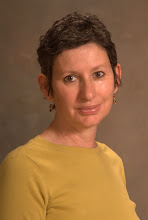At USC/Norris Cancer Hospital, patients check into Day Hospital for their chemo treatments. You may be imagining a foreboding place populated by really sick people. I pictured a darkened room where everyone was incapacitated because of nausea. But my preconceived notions were just wrong. Let me draw you a more accurate picture.
Instead of beds, Day Hospital is furnished with about 25 blue barca loungers. The room is bright with a large bank of windows, and the nurses are both cheerful and competent. Patients are assigned to a blue recliner, where they put their feet up, cuddle into a light blanket, and idly pass the time. Some people bring laptops. Others doze, read, listen to IPODs, or chat with the person in the adjacent recliner. Meanwhile, their IVs do the heavy lifting and control the steady drip of drugs into their veins.
What is striking about Day Hospital is that there is no single characteristic that typifies a cancer patient -- not gender, not class, not race. Not even age is a reliable indicator, since some patients have been surprisingly young. Over the course of my treatments, I've exchanged smiles with a business woman in her fifties, who was working industriously on her laptop. I've observed a man in his forties, who napped while his wife patiently sat reading beside him. And I've eavesdropped on a couple in their sixties, who were frantically working their phones to rectify a lapse in their health insurance coverage.
On my last visit to Day Hospital, I chatted briefly with an elderly woman who was talking to everyone who walked by her chair. Dragging my tethered IV stand with me, I walked over to her to ask about her elegant knit cap. I was curious if she had stitched it herself. A flattering shade of green, the hat sat perfectly on her head, falling just over her ears and low on her forehead, but still allowing her luminous blue eyes to peer out. In response, she proudly told me that her daughter had knitted several such caps for her in advance of her hair falling out.
In turn, she asked me about my eyebrows. She wanted to know whether I had I lost them and then had re-grown a new set, or if I was still holding onto my original pair. I happily answered that I was still holding onto my pre-chemo brows, as if this were an achievement for which I could actually take credit. She confided that her brows had vanished, but she had since grown a new set. We chuckled together at the indignities. But as I went back to my own recliner, I had a twinge of worry about her. Despite her gregariousness, she appeared frail and was getting a blood transfusion while we talked.
For the most part, though, people have not seemed that sick. Their demeanors have been normal, and as far as I can tell, people are eating. Most patients have readily accepted the nurses' offers of sandwiches or soup. I heard one man even ask if he could have a bottle of Dos Equis with his lunch. The nurse replied, "What?" He repeated, "Dos Equis." Again, she said, "What?" On his third try, he said, "A bottle of beer." The nurse responded, "Oh, if you had said cerveza, I would have understood." Undeterred, the man said, "Well, can I have a cerveza?" "No" was her answer, but she did bring him a coke.
Chemo, it's just not what you expect.
3/24/08
Subscribe to:
Post Comments (Atom)





No comments:
Post a Comment